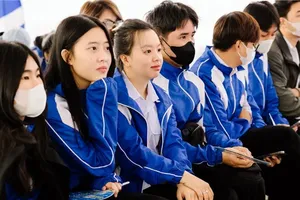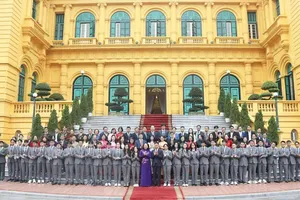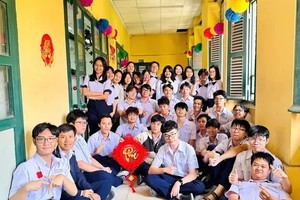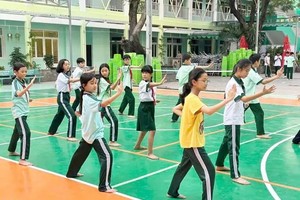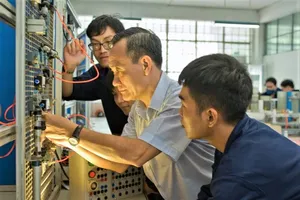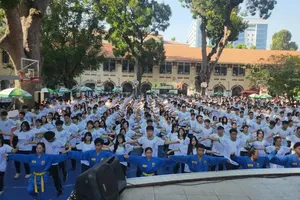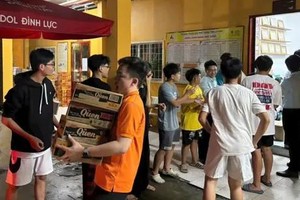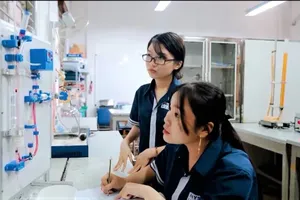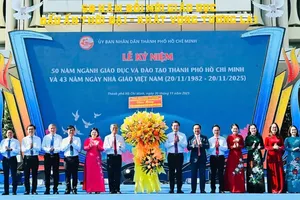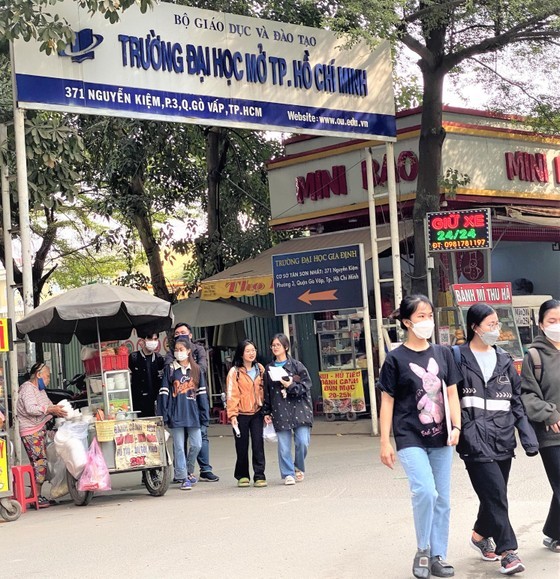 |
| A branch of Ho Chi Minh City Open University (Photo: SGGP) |
Two universities namely Ho Chi Minh City Open University and Gia Dinh University have been hiring the facility at 371 Nguyen Kiem Street in HCMC’s Go Vap District as a training location. Both schools share the same campus and are divided into two entrances for students of each school. Worth mentioning, the Ho Chi Minh City Open University has been established for 29 years, but it still has to hire facilities as its campus.
All campuses of the Gia Dinh University which were established in 2007 are hired. In addition to this location, Gia Dinh University also rents a premise at 185-187 Hoang Van Thu Street in Phu Nhuan District.
Furthermore, the Ho Chi Minh City University of Food Industry was established in 1982, it has been 40 years now, but it is still struggling to hire a training facility. Currently, the school managers have rented a facility at 31 Che Lan Vien Street in Tan Phu District for training and practice for electrical, electronic and mechanical faculties while the school's General Education Center is located at a premise on Tan Ky Tan Quy Street, not far from the campus at 31 Che Lan Vien Street.
Meanwhile, a series of private universities have been also hiring facilities in many places as their campuses. For instance, Hoa Sen University has a main campus in District 1 but still has to rent premises in District 3 and District 12. Elsewhere in the city, Nguyen Tat Thanh University poured a lot of money into building its facilities, but it still has to hire facilities in many places in District 7 and District 12. The Hong Bang International University has to rent a venue at 120 Hoa Binh, Hoa Thanh ward, Tan Phu District to be its campus.
Very few schools have land to invest in building facilities. The Saigon Gia Dinh College is renting premises at 514 Le Quang Dinh Street in Go Vap District. Notably, the school uses this location as its training facility for higher education learners and its elementary school, junior high school, and high school.
The Saigon Polytechnic College rents a house at 32 Nguyen Binh Khiem Street in Go Vap District. Many other colleges such as Viet My College, Ho Chi Minh City International College, Dai Viet Saigon College, Ho Chi Minh City Pharmacy College, and Saigon College of Technology also mainly rent out facilities as lecture halls.
Vice Principal of Ho Chi Minh City University of Food Industry Thai Doan Thanh said that the school rents a premise on Che Lan Vien Street in Tan Phu District where students can practice what they have learned. The school has a land lot behind the main campus, but its application for construction procedures for many years has not been approved. Therefore, the school has no choice but to hire a place for students to study and practice.
Vice Principal of Gia Dinh University Trinh Huu Chung acknowledged that currently, the two campuses of the school are rented, which affects the quality of training as well as the care of learners. He added that by September 2023, the Open University of Ho Chi Minh City will end its lease at 371 Nguyen Kiem Street in Go Vap District and the school will continue to lease this place for up to 19 years. With long-term rent, the school will focus on investing and taking better care of students.
A principal of a private university in Ho Chi Minh City admitted that renting facilities certainly affects the training quality of the schools because schools cannot invest in a lot of machinery and equipment for training at rented campuses. Moreover, facility rents also account for a lot of training costs. Schools themselves do not want to rent, but as per the present regulation, the construction of universities and colleges inner the city is not allowed, even many schools with land lots.
According to Hoang Ngoc Vinh, a former member of the Advisory Group of the National Committee for Innovation in Education and Training for the 2016-2021 period, building training institutions is a rather difficult problem for universities and colleges due to limited land inner the city. Plus, the government does not have conditions to support educational institutions; therefore, schools have to rent places as campuses which certainly affects the quality of training because the number of students in a class may increase and there will be a lack of laboratories and workshops.
The Ministry of Education and Training has regulations on enrollment quotas based on two main factors including construction floor area and teaching staff, but cannot prohibit schools from renting facilities if the rental location meets the requirements of quality conditions. However, this situation must be minimized by limiting the degree of autonomy in opening majors and determining enrollment quotas. Even educational competent agencies can close a major if it fails to meet the quality assurance requirements. This requires the management agency to keep a close watch on the issue and publicize this so that learners will then have a better choice of studying in another educational institution.






